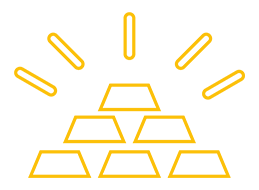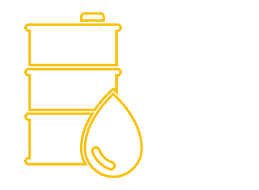Gold AM/PM Fixing Learn More
2 way trading -
Go Long. Go Short
Award-winning
platform
Risk management
tools
Research
and Analysis

Ultra-fast
execution
What is Commodity Trading?
Commodity trading offers trader an opportunity to diversify a portfolio beyond the traditional securities. The investor may form a long-term strategy or speculate on instances of unusual volatility. Commodities trading refers to the buying and selling of physical assets including gold, silver, oil, wheat, or sugar. These commodities form the cornerstones for the global economy and are traded on exchanges across the world. Commodities are categorized as soft and hard. Soft commodities refer to agricultural products like wheat and sugar, whereas hard commodities refer to energies and metals.
Types of Commodity Trading
CFDs
You can trade commodity CFDs, the popular way to gain exposure across a wide range of commodities, without directly owning the underlying asset. A trader can start with just a small initial deposit.
CFDs Options
You can trade CFDs options in the commodity trading market, with a small ‘premium.’ Options gives a trader the right, but not the legal authority to buy or sell the commodity.
Forwards
Commodity forward contracts refer to agreements by which sellers and buyers are obligated to execute the order of the underlying asset in the future, set at a pre-determined price and date. Usually, forwards are not traded on exchanges.
Spot
You can trade the commodities on the spot market. For instance, in silver commodity trading, one can trade spot silver or in gold commodity trading one may trade spot gold. This helps a trader to benefit from high liquidity and competitive spread.
Stocks
Trading commodity focused stocks is another way to gain exposure in the commodity market. This helps a trader to broaden his portfolio and minimize the risk factor.
ETFs
Trading commodity ETFs allows investor to trade physical commodities, including natural resources, agricultural goods, and precious metals. The trader can also gain from transparent pricing.
Benefits of Commodity Trading




How & where commodities are traded?
Commodities are usually traded as futures contracts. These are simple agreements that enable trading an asset at a decided price and predetermined date in the future. This enables you to trade the contracts themselves without having to own the underlying asset.
Commodities are majorly traded across several exchanges with expertise in select markets, that include:





Enhanced way to trade commodities
Trade commodity CFDs which allow for a cost-efficient and short-term trading across 100+ commodities.
Also, you have the option to trade major commodity indices. These indices offer a fresh perspective and a cost-efficient way to trade on the broader commodity market, giving you wide exposure to multiple commodities in a single trade.
The following three commodity indices are designed in the similar way as an index CFD:
Agricultural Index
The Agricultural Index involves Corn, Soybean, Soybean Meal, Coffee Arabica, Coffee Robusta, US Cocoa, Wheat, Sugar Raw, Cotton, Soybean Oil, Sugar White, and Oats, covering a wider spectrum of the soft commodities sector.
Energy Index
The Energy Index is designed to offer an indication of how the broader energy sector is performing. This index includes Brent & WTI Crude Oil, Natural Gas, Gasoline, Heating Oil and Low Sulphur Gasoline. Crude Oil is popularly traded energy commodity, globally.
Precious Metals Index
The Precious Metals Index groups several precious metals together so that you can gain exposure to the sector. It comprises Gold, Silver, Platinum and Palladium, wherein gold is one of the top traded commodities on the platform.
Why trade commodities with Century Financial?
We offer CFDs and Exchange Traded Products on a wide range of cash and forward commodities, including WTI Crude, Gold, Silver, Platinum, Palladium, Aluminium, Copper, Wheat, Sugar, Coffee, and over 100+ commodities across all major exchanges.
• Go long or short easily
• Ability to trade intra- and inter-market spreads
• Nearly 24 hours of trading on global exchanges including CME, ICE, LME
• Contracts based on both Futures and Spot
• Trade mini and micro lots

Metals
Trading metals most popularly involves silver and gold trading.

Energy
Natural gas and Oil trading are categories which are prevalently traded under energies.

Softs
Trading Soft commodities primarily involves coffee, cocoa, sugar, corn, wheat, and livestock.
Frequently Asked Questions (FAQs)
Is commodity trading profitable?
Trading in commodity CFDs is done to speculate the changes in the prices of commodities. If a trader believes that the price of a commodity is expected to go up, s/he opts to go long on the instrument. If the trader considers that the price might go down, s/he can choose to short the instrument.
If the prices change in line with expectations, the trader profits from the trade, otherwise, the trade results in loss. Hence, trading carries risk, and stop losses are a must while placing an order.
Which commodities are best to trade?
Most popularly traded commodity futures include crude oil benchmarks like WTI and Brent crude, and gold. Other commodities are silver, copper, natural gas, cocoa, coffee, soybeans, iron, platinum, palladium, to mention a few.
What is a Commodity Index?
A commodity index is based on the underlying commodities, with constituents such as wheat, oil, gold, or soybeans. A commodity index tracks the basket of commodities, and the performance of the index depends on the price changes of the underlying commodities.
Are commodities riskier than stocks?
Commodities are considered the most volatile asset class. Stocks, bonds, and currencies have lower variance and more liquidity than commodities. It is not unusual if the prices of a raw material halves, doubles, triples, or even more over a very short period.
What causes commodity prices to change?
Primarily, supply and demand influence the commodity prices. Other factors include: weather, international events, government policies, shifting consumer preferences, and input costs.
How can beginners trade in commodities?
A beginner must be aware of the underlying risks while trading commodity CFDs and must practice enough on the demo account. Furthermore, the trader must be updated on the events that could influence the price of the commodity in the watchlist.
Ready to Invest?
Explore a new trading experience with
Century Trader App
Losses can exceed your deposits
Ready to Invest?
Explore a new trading experience with
Century Trader App
Losses can exceed your deposits











